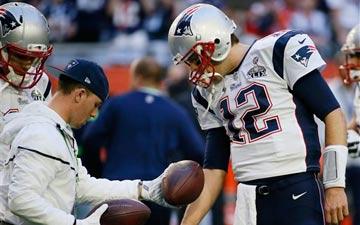
Brady, Patriots, NFL Fail the First Test of Leadership
I’m not saying Tom Brady doesn’t bear culpability in Deflategate, the National Football League’s scandal du jour, in which the New England Patriots and their quarterback have been sanctioned for deflating footballs used in the AFC championship game. I am saying that, in this case, we have a team taking one for the player, instead of the other way around, and little evidence of leadership in action at any level.
Creating a culture is a leadership function.
If Brady thinks of himself as a leader, then he is responsible for the Patriots’ team culture, the scabs of which have been picked off in communications we have become privy to between the team’s quarterback, its equipment manager, and locker-room watchdog. After reading the report and its footnotes, it reveals a culture that promotes every person getting a little something extra for himself.
I’m not sure Brady sees himself as a leader, nor does Coach Bill Belichick. Belichick’s behavior certainly has not exuded the kind of the-buck-stops-here posture many leaders take in tough situations. Team owner Robert Kraft did adopt that stance, along with ill-placed indignation as it turns out. He is the organization’s formal and informal leader. The culture of the Patriots is his responsibility and his announcement Tuesday that he will not appeal the team’s Deflategate fine confirms that. He knows a good deal when he sees one and $1 million is a small price to pay for keeping a tarnished Super Bowl ring.
The NFL’s culture is Roger Goodell’s responsibility and he seems to promote one where individual stardom trumps all. That is counter to what many players love about the game: the necessary teamwork required for a win, the all-out effort of every player on the field, the feeling of family in the locker room, the sacrifice individuals are willing to make for the benefit of the whole team.
Goodell is a corporate CEO who has been wise enough, at least, to drop the ruse of nonprofit status from the business of professional football, a savvy move for a man who makes $44.2 million a year. We keep reading about the NFL’s missteps because Goodell’s values are out of step with players’ values in the league he leads. Many want to be part of something bigger than any one person, to sacrifice individual desires for a team outcome, to achieve more by working with others than can be achieved alone.
What puts Brady in the crosshairs of criticism is that he has played for the Patriots for over a dozen years. That’s long enough to know better, or perhaps more accurately, simply to know. Brady must now have some sense of what the organization’s values are, how decisions are made, employees treated and what the consequences are when lines are crossed. He’s been there long enough to live through Spygate, partner with Belichick, and know what kind of operation Robert Kraft runs — ample time to decide whether or not his values are aligned with the organization’s.
In this case, the team took one for the player. Brady stayed and played. He advanced, with Peyton Manning, a league rule change that acknowledges every quarterback likes his football “a little bit different, “ as he said when proposing the rule change in 2006.
Given how up front he was about asking the league to make a change quarterbacks wanted, I suspect Brady does not think of himself as a cheater. “I would never break the rules,” he said. But, he is not above asking that rules be changed to suit him, which certainly seems to capture the essence of the NFL’s culture.
As NFL commissioner, Goodell has failed to improve upon societal issues, to set the rules of play fairly for the superstars and the walk-ons alike, and uphold them in way the reinforces that rules are not drafted to benefit individuals, but to serve some common good.
Goodell seems to have crowd-sourced his rulings on Deflategate. If he were genuinely leading the NFL and believed the deflation of footballs influenced fair play, its policies about equipment preparations for games would be different and this Super Bowl victory would be vacated, reinforcing that the biggest mistake a player makes is one that costs his team. In this case, perhaps the team cost the player.
Ann Skeet is director of leadership ethics at the Markkula Center for Applied Ethics at Santa Clara University. This article appeared originally on MarketWatch.